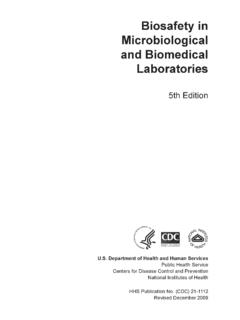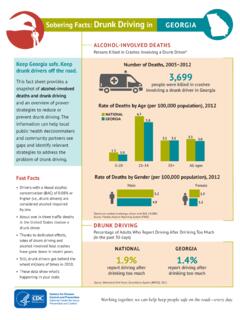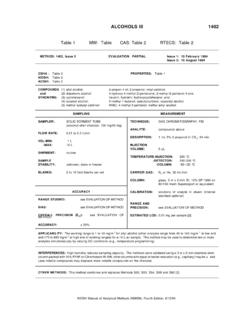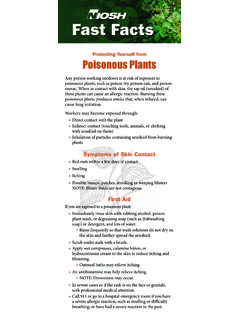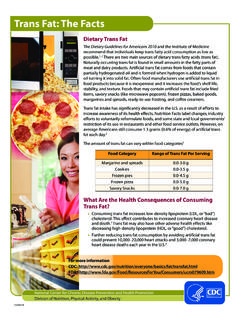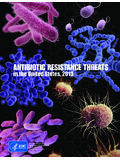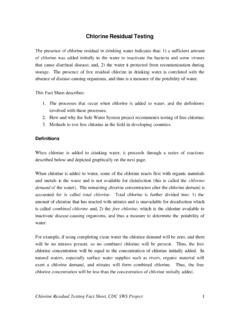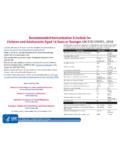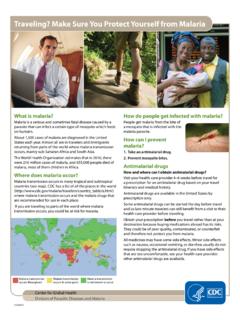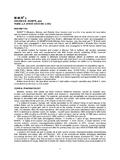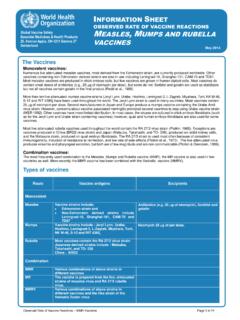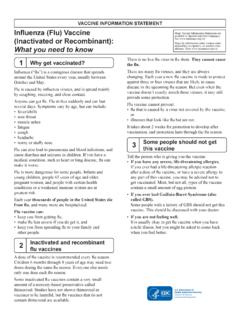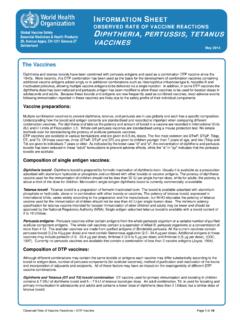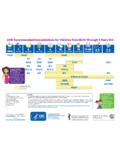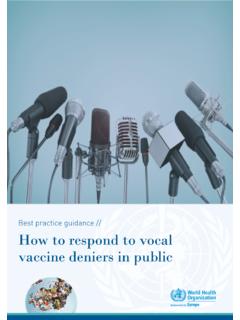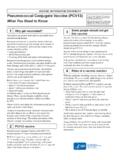Transcription of 2018 Combined Recommended Immunization …
1 Recommended Immunization schedule for Adults Aged 19 Years or Older, United States, Department of Health and Human ServicesCenters for Disease Control and PreventionIn February 2018, the Recommended Immunization schedule for Adults Aged 19 Years or Older, United States, 2018 became effective, as Recommended by the Advisory Committee on Immunization Practices (ACIP) and approved by the Centers for Disease Control and Prevention (CDC). The adult Immunization schedule was also approved by the American College of Physicians, the American Academy of Family Physicians, the American College of Obstetricians and Gynecologists, and the American College of announced the availability of the 2018 adult Immunization schedule in the Morbidity and Mortality Weekly Report (MMWR).
2 1 The schedule is published in its entirety in the Annals of Internal adult Immunization schedule consists of figures that summarize routinely Recommended vaccines for adults by age groups and medical conditions and other indications, footnotes for the figures, and a table of vaccine contraindications and precautions. Note the following when reviewing the adult Immunization schedule : The figures in the adult Immunization schedule should be reviewed with the accompanying footnotes. The figures and footnotes display indications for which vaccines, if not previously administered, should be administered unless noted otherwise.
3 The table of contraindications and precautions identifies populations and situations for which vaccines should not be used or should be used with caution. When indicated, administer Recommended vaccines to adults whose vaccination history is incomplete or unknown. Increased interval between doses of a multidose vaccine series does not diminish vaccine effectiveness; it is not necessary to restart the vaccine series or add doses to the series because of an extended interval between doses. Combination vaccines may be used when any component of the combination is indicated and when the other components of the combination are not contraindicated.
4 The use of trade names in the adult Immunization schedule is for identification purposes only and does not imply endorsement by the ACIP or populations that need additional considerations include: Pregnant women. Pregnant women should receive the tetanus, diphtheria, and acellular pertussis vaccine (Tdap) during pregnancy and the influenza vaccine during or before pregnancy. Live vaccines ( , measles, mumps, and rubella vaccine [MMR]) are contraindicated. Asplenia. Adults with asplenia have specific vaccination recommendations because of their increased risk for infection by encapsulated bacteria.
5 Anatomical or functional asplenia includes congenital or acquired asplenia, splenic dysfunction, sickle cell disease and other hemoglobinopathies, and splenectomy. Immunocompromising conditions. Adults with immunosuppression should generally avoid live vaccines. Inactivated vaccines ( , pneumococcal vaccines) are generally acceptable. High-level immunosuppression includes HIV infection with a CD4 cell count <200 cells/ L, receipt of daily corticosteroid therapy with 20 mg of prednisone or equivalent for 14 days, primary immunodeficiency disorder ( , severe Combined immunodeficiency or complement component deficiency), and receipt of cancer chemotherapy.
6 Other immunocompromising conditions and immunosuppressive medications to consider when vaccinating adults can be found in IDSA Clinical Practice Guideline for Vaccination of the Immunocompromised Additional information on vaccinating immunocompromised adults is in General Best Practice Guidelines for resources for health care providers include: Details on vaccines Recommended for adults and complete ACIP statements at Vaccine Information Statements that explain benefits and risks of vaccines at Information and resources on vaccinating pregnant women at Information on travel vaccine requirements and recommendations at CDC Vaccine Schedules App for Immunization service providers to download at Adult Vaccination Quiz for self-assessment of vaccination needs based on age, health conditions.
7 And other indications at Recommended Immunization schedule for Children and Adolescents Aged 18 Years or Younger at Report suspected cases of reportable vaccine-preventable diseases to the local or state health department, and report all clinically significant postvaccination events to the Vaccine Adverse Event Reporting System at or by telephone, 800-822-7967. All vaccines included in the adult Immunization schedule except 23-valent pneumococcal polysaccharide and zoster vaccines are covered by the Vaccine Injury Compensation Program. Information on how to file a vaccine injury claim is available at or by telephone, 800-338-2382.
8 Submit questions and comments to CDC through or by telephone, 800-CDC-INFO (800-232-4636), in English and Spanish, 8:00am 8:00pm ET, Monday Friday, excluding following abbreviations are used for vaccines in the adult Immunization schedule (in the order of their appearance):IIVinactivated influenza vaccineRIVrecombinant influenza vaccineTdaptetanus toxoid, reduced diphtheria toxoid, and acellular pertussis vaccineTdtetanus and diphtheria toxoidsMMRmeasles, mumps, and rubella vaccineVARvaricella vaccine RZVrecombinant zoster vaccineZVLzoster vaccine liveHPV vaccinehuman papillomavirus vaccinePCV1313-valent pneumococcal conjugate vaccinePPSV2323-valent pneumococcal polysaccharide vaccineHepAhepatitis A vaccineHepA-HepBhepatitis A vaccine and hepatitis B vaccineHepBhepatitis B vaccineMenACWY serogroups A, C, W.
9 And Y meningococcal vaccineMenBserogroup B meningococcal vaccineHibHaemophilus influenzae type b vaccine1. MMWR Morb Mortal Wkly Rep. 2018;66(5). Available at Ann Intern Med. 2018;168:210 220. Available at Clin Infect Dis. 2014;58:e44-100. Available at ACIP. Available at 1. Recommended Immunization schedule for adults aged 19 years or older by age group, United States, 2018 This figure should be reviewed with the accompanying footnotes. This figure and the footnotes describe indications for which vaccines, if not previously administered, should be administered unless noted 21 years22 26 years27 49 years50 64 years 65 yearsInfluenza1 Tdap2 or Td2 MMR3 VAR4 RZV5 (preferred)ZVL5 HPV Female6 HPV Male6 PCV137 PPSV237 HepA8 HepB9 MenACWY10 MenB10 Hib111 dose annually1 dose ZVL2 doses RZV (preferred)1 dose1 dose2 or 3 doses depending on age at series initiation2 or 3 doses depending on age at series initiation1 or 2 doses depending on indication (if born in 1957 or later)
10 1 dose Tdap, then Td booster every 10 yrs1 or 2 doses depending on indication2 or 3 doses depending on vaccine3 doses2 doses1 or 2 doses depending on indication, then booster every 5 yrs if risk remains2 or 3 doses depending on vaccine1 or 3 doses depending on indicationRecommended for adults who meet the age requirement, lack documentation of vaccination, or lack evidence of past infectionRecommended for adults with other indicationsNo recommendationororFigure 2. Recommended Immunization schedule for adults aged 19 years or older by medical condition and other indications, United States, 2018 This figure should be reviewed with the accompanying footnotes.

